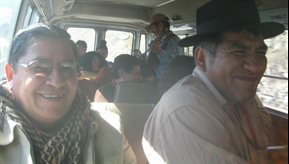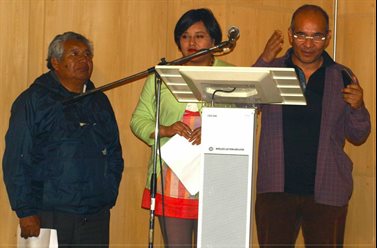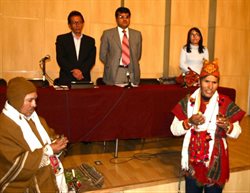Conversation with Experts

Following
two full days of discussion in Coroico, the workshop participants were
transported back to La Paz – a bus journey of three hours – for the round table
“Do Cultures Have Owners.” This
culmination of the workshop took the form of a public ‘Conversation with Experts’
hosted by the Museum of Ethnography and Folklore (MUSEF), its format modelled
on BBC Radio 4’s ‘The Moral Maze’. A series of questions, formulated during the workshop in Coroico, were posed to the Minister of Cultures (Pablo Groux) and representatives from the National Intellectual Property Service (SENAPI) and the Bolivian Music Royalties Society (SOBODAYCOM).
Jorge Oporto and Clemente Mamani - Photo credit Henry Stobart
QUESTIONS FOR THE EXPERTS OF THE ROUND TABLE
· Cultural Heritage: What do you intend to do to prevent cultural heritage processes from generating internal and/or international conflicts, and to promote their implementation among citizens and indigenous communities? In this regard, we have cited examples of mistakes that have been made in this field, mistakes that have generated conflict because of cultural heritage declarations that have been made without the backing of proper research (documentation and cataloguing) or consultation. To what extent could documentation and registration be used to portray what cultures are, so that what is being done with cultural policies could be properly sustained?

· Research: The participants consider that participatory research and “self-research” can be alternatives to avoid conflicts such as the ones previously mentioned. However, there seems to be a lack of resources (human and economic) to generate studies of this kind. What will be done to promote this kind of work? What special considerations are in place for the research and registry of cultural expressions that may be considered secret or sacred?
· Dissemination: What will be done to increase the proper, fair, and equitable dissemination of national cultural productions in the media?
· Plans and departmental cultural polices: Given that the hope is to create departmental cultural plans around the country, to what extent is the central government willing to be a part of the formulation and implementation of these departmental plans?
How do you intend to fulfil commitments made to indigenous peoples? Are you ready to guarantee the consultation process? When do you intend to approve the country’s laws on cultures and heritage?
Angel Yandura Aramayo, Sharoll Fernández and Iván Nogales - Photo credit: Phoebe Smolin
· In the National Intellectual Property Service and the Ministry of Cultures, what registration policies currently exist for indigenous cultures? How do policies differ between these two entities?
· Society tends to consider cultural heritage as a synonym for property. What is your opinion on this issue? What do you intend to do to address the confusions that result from this erroneous interpretation?
· How are you working with indigenous cultures? How do you identify and register indigenous music? How are royalties distributed in these cases?
· It was noted that when producers used to deal directly with national authors, the latter reaped more royalty benefits than they do now under representation by SOBODAYCOM. How can we improve the distribution of royalties among national authors today?
· Participants expressed concern that the law, as carried out by collective management societies, is satisfying neither peoples’ needs nor their expectations of recognition. Would SENAPI and SOBODAYCOM be in a position to allow the implementation of alternative licenses, like Creative Commons or other alternative proposals for recognition in this field?
· Considering that we are living under a state of a transitional and participatory democracy, one that recognizes the plurinational character of the country, would SENAPI and SOBODAYCOM be willing to participate in the redefinition of their policies so as to bring them more in line with this historical moment? Do you feel you are part of this cultural revolution?
· Given that the current government is committed to adjusting international regulations and agreements to the new Constitution, what proposals have been generated to date on the topics of recognition and cultural heritage? What progress has been made?
· As Bolivia is now a plurinational state, how do you intend to address international agreements and treaties related to intellectual property and heritage? What criteria is the State taking into account as it readjusts the regulations on intellectual property and cultural heritage to the new Constitution?
 For the most
part, the panel of experts did not direct themselves to the specific questions
Workshop participants posed. Because
workshop participants presented their questions all together, within two group
presentations, the panellists easily skirted some of the key challenges, and
instead reverted to their usual role of informing the public about “how it
works”: how their offices work, how to register music, how to register intellectual
property, etc. It took some time before
the discussion went beyond the how-to presentation and landed on what many of
the workshop participants were getting at—the need to re-examine the whole
picture of culture, creativity, and innovation in a way that would be
consistent with Bolivia’s historically different moment.
For the most
part, the panel of experts did not direct themselves to the specific questions
Workshop participants posed. Because
workshop participants presented their questions all together, within two group
presentations, the panellists easily skirted some of the key challenges, and
instead reverted to their usual role of informing the public about “how it
works”: how their offices work, how to register music, how to register intellectual
property, etc. It took some time before
the discussion went beyond the how-to presentation and landed on what many of
the workshop participants were getting at—the need to re-examine the whole
picture of culture, creativity, and innovation in a way that would be
consistent with Bolivia’s historically different moment.
At one
point, Cultures Minister Groux, responding in part to an exasperated workshop
participant, stated that he did think that the entire systems of heritage and
intellectual property, in all areas, not only under the Ministry of Cultures,
should be re-examined and restructured.
He pointed out the lack of communication and coordination between SENAPI
and the different state ministries that were dealing with these same issues that
had been bureaucratically cordoned off in more traditional ways. On the other
hand, the representative from SOBODAYCOM tended to defend the positions of the
society with respect to its royalty collection practices. Some audience members who had not attended
the workshop also registered discomfort with the idea of moving away from
protective measures in the area of heritage and folklore; particularly those
who work in urban-based folklore dancing clamoured for more, not fewer,
protective measures. One workshop
participant made a passionate plea to Culture Minister Groux to fund more
research of the cultures of his region.
A representative from the Defensor
del Pueblo moderated part of the debate; and Bernardo Rozo, a workshop
organizer, stepped in when she had to leave.
Ritual preceding the conversation with experts - Photo credit: Phoebe Smolin

Rethinking Creativity, Recognition and Indigenous Heritage by https://www.royalholloway.ac.uk/boliviamusicip/home.aspx is licensed under a Creative Commons Attribution-NonCommercial 4.0 International License.
Based on a work at https://www.royalholloway.ac.uk/boliviamusicip/home.aspx